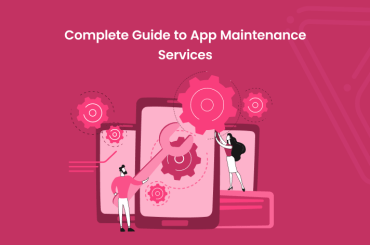In the field of Mobile App Development, native vs hybrid app is one of two unique paths to take, both with their own merits. Native apps offer the best performance as they are built for a specific platform (like iOS and Android) and can easily integrate with the features of the device, making them suitable for complex applications.
However, hybrid apps work to allow for cross-platform capabilities based on one single codebase meaning that the development time and costs can be lessened. The native vs hybrid app dilemma makes a vital difference in terms of user experience as well as the reach of an app for businesses caught between budget and functionality.
Partnering with a Mobile App Development Company in Chennai can help you navigate this decision to achieve the best results for your business.
What is Native App?
A native app is a type of app you would typically download from an app store and install directly in your mobile. The app is designed specifically for one platform, either i.e. Android or Windows, etc to provide maximum performance and user satisfaction.
Pros and Cons of Native Apps
| Pros | Cons |
|---|---|
| Excellent performance and excellent user experience | Higher costs of development |
| Unlimited access to device features | Takes more time to develop for multiple platforms |
| Optimized for each platform | Need different maintenance for each platform |
What is a Hybrid App?
A hybrid-app is a mobile app that combines elements of both native and web apps. It is built with web technologies (HTML, CSS, and JavaScript), having a single codebase available on many platforms.
Pros and Cons of Hybrid Apps
| Pros | Cons |
|---|---|
| Low-Cost but Fast to Deploy | May have slower performance |
| Easier Maintenance due to a single codebase | Access to small select device features |
| More rapid cross-platform development | It may not be seamless for user experience |
Benefits of Native Vs Hybrid App
Native Apps:
- Performance: Since they are native apps, they can be multiple times speedier and smooth as compared to other web-based apps.
- Complete Integration with Device: They can utilize all platform-specific features without effort.
- User Experience: Native apps deliver a high-quality, platform-specific experience.
Hybrid Apps:
- Cost Savings: In the native vs hybrid app challenge, hybrid apps maintain a single codebase and are hence more pocket-friendly to develop.
- Quick to Deploy: Easier and faster to develop and deploy cross-platform.
- Easier Maintenance: The ability to deploy updates simultaneously across platforms is a strong benefit of hybrid apps compared to native.
Native vs. Hybrid Apps: A Detailed Analysis
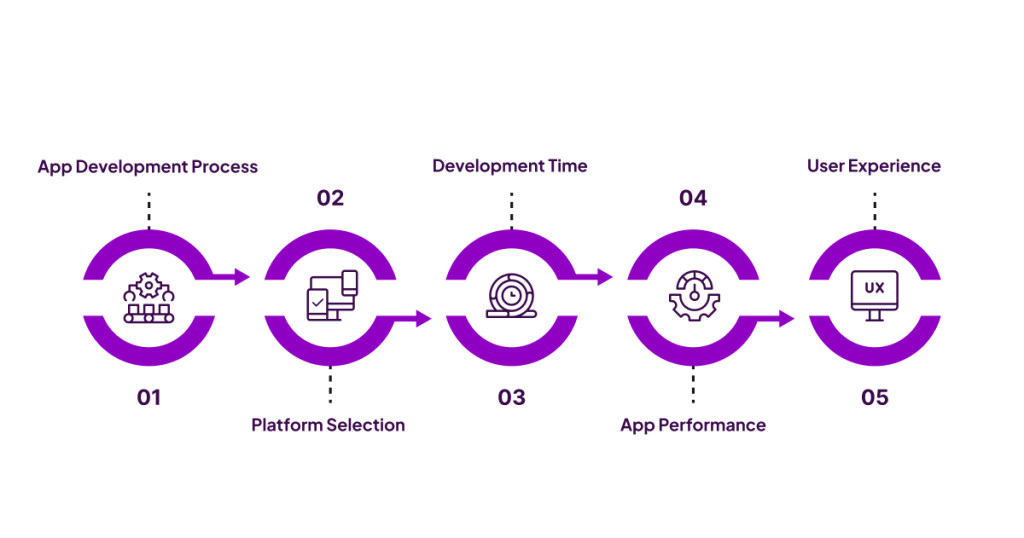
When comparing native vs hybrid apps, native apps are the fastest and give the best user experience, while hybrid apps focus on portability across platforms and speed of delivery. Each one serves different needs, so the choice is up to your budget, deadlines and app complexity.
- Native: It adds complexity but also increases features and can deepen integration.
- Hybrid: Single codebase makes the path easier as it reduces complexity and speeds up deployment for cross-platform apps.
- Platform Selection
- Native: Best for businesses that give importance to functionality and performance on a platform.
- Hybrid: Suitable for cross-platform apps, it simplifies development and deployment by sharing code.
- Development Time
- Native: Typically longer because each platform needs separate coding, testing and adjustments.
- Hybrid: Quicker development time due to a single codebase which allows for faster deployment across platforms.
- App Performance
- Native: It is known for its high performance, especially for apps that need real time response & huge amounts of data.
- Hybrid: Generally able to fit a variety of needs, but can take time for hybrid apps to respond as they rely on web technology.
- User Experience
- Native: Provides a highly responsive, native user interface not only enhances the overall experience of the user.
- Hybrid: Offers a unified experience across platforms, but may have fewer platform-specific nuances.
Native vs Hybrid App: Which to Pick and What is Right For You?
Deciding of native vs hybrid app development always circle around the need for app performance, budget and timeline. If you are working with Android app Development Companies in Chennai, you may want to consider native apps for high-performance, feature-rich applications on a single platform, native apps are better.
On the other hand hybrid apps fit best in cases of lower budget projects that need to reach a wider audience across multiple platforms. Both have their unique benefits, so select the one which better aligns with your project scope and your audience’s expectations.
Challenges of Native vs. Hybrid Apps
Native Apps:
- Development cost is higher: Native apps are more expensive because it needs to build a different codebase for both platforms.
- Slower Development Process: Creating for numerous platforms is a lengthier process, which slows down launch.
Hybrid Apps:
- Performance Limitations: Hybrid apps are somewhat slower, especially for more complex features.
- Restricted Access to Device Features: It may face challenges in accessing certain platform-specific features, limiting their capabilities.
Tip: To simplify this, consulting with a Flutter App Development Company in India could help create apps faster without compromising functionality.
Hiring Developers: Native vs Hybrid App
| Native App Developers | Hybrid App Developers | |
|---|---|---|
| Skills Required | Ready on platform-dependent languages such as Swift (iOS) or Kotlin (Android). | Familiarity with web technologies such as HTML, CSS, JavaScript and frameworks like React Native or Flutter. |
| Cost | Increased cost of hiring labor due to specific knowledge of the platform. | Reduced cost, since one developer can develop for both the platforms. |
| Hiring Process | Requires platform-specific knowledge which can make for a longer recruitment period. | Faster to hire since cross-platform skills have become more common. |
Top Features of Native and Hybrid App
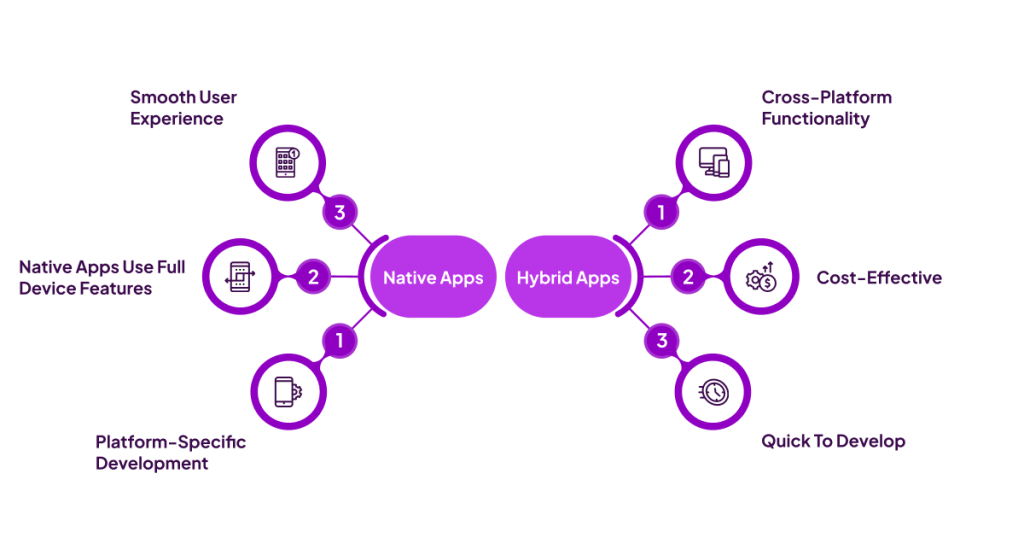
Native Apps:
- Platform-Specific Development: Native apps are designed individually for each platform to give better performance
- Native Apps Use Full Device Features: Native apps can take full advantage of all the device hardware and features.
- Smooth User Experience: Native applications have a fast working interface and provide great interaction.
Hybrid Apps:
- Cross-Platform Functionality:: Hybrid apps serve across multiple platforms using a single codebase, making it the core of native vs hybrid app discussion.
- Cost-Effective: The development is inexpensive as it utilizes shared code across different platforms.
- Quick To Develop: When it comes to the native vs hybrid app debate, speed to develop and launch greatly favors hybrid apps.
Tip: If cross-platform development is your priority, consulting an iOS App Development Company in Chennai could offer valuable insights.
Which app is best for making business?
If your business requires highest-level performance along with user engagement, native apps are the best. They provide a platform-specific experience that is the fastest and feature-rich, which makes them ideal for complicated applications with lots of features.
Hybrid apps, however, suit best for the startups and businesses with limited budgets looking to achieve wider usability in a cost-effective manner. Your native vs hybrid app decision will ultimately depend on your business goals, the desired functionality of your app, and how quickly you want to build it.
7 Key Questions to Consider When Choosing Native vs. Hybrid Apps
When choosing between native vs hybrid apps, it’s important to consider your needs, resources, and business goals. An App Development Company in Chennai like Pyramidion can help guide you through this decision-making process. Here are 7 key questions to consider:
- Development Timeline: How soon do you need an app to be market-ready?
- Financial Resources: What are you looking to spend on initial development and long-term maintenance?
- Where your audience is: Do you need to reach users on multiple platforms for your app?
- Performance Needs: Is your app in need of a high-performance and fast speed?
- User Experience: Do you need a platform-specific, customized user experience?
- Feature Needs: Does your app require complete access to device features?
- Scalability: Will your app need to quickly scale across platforms as it expands?
App Updates: Native vs Hybrid Apps
Native Apps
Native apps require separate updates for every platform they are on, which can be time consuming and increases the maintenance cost. Though, the changes provided can be specific for a platform to enhance the performance of that platform and user experience on each device.
Hybrid Apps
With a single codebase, hybrid apps enable updates to be delivered across all platforms at once. However, it can restrict platform-specific improvements compared to native apps; but this simple update process saves time and also resources.
Examples of Native and Hybrid Apps
Native Apps
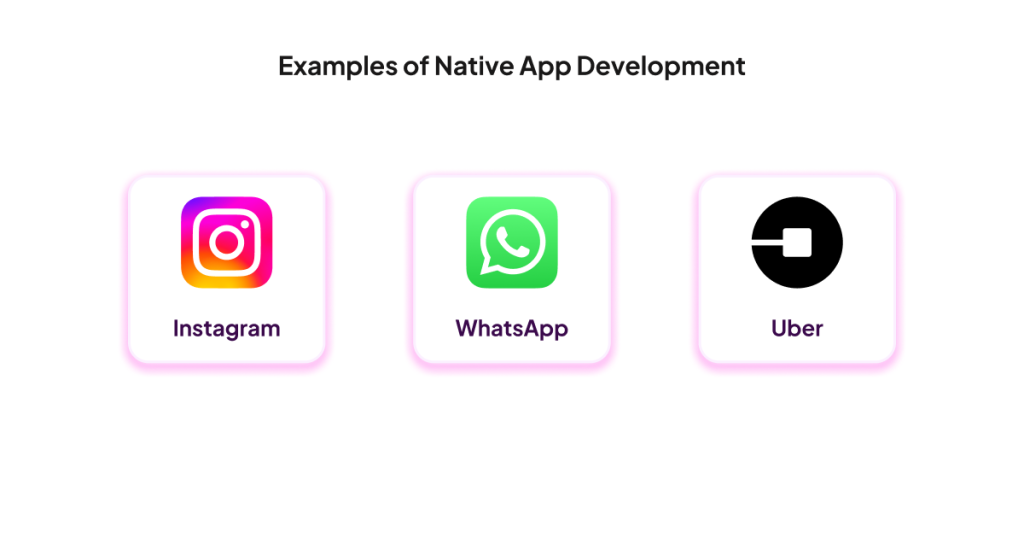
- WhatsApp: A high-performance messaging app with a complete native integration, making it the perfect example of the hidden cost in native vs hybrid app.
- Instagram: A great example of a native app is Instagram which runs on iOS & Android. It is famous for its smooth user experience and rapid response time.
- Uber: Uber uses real-time tracking and several other complex features, which makes native development full of benefits when it comes to the discussion of native vs hybrid apps (i.e. better performance, speed and reliability).
Hybrid Apps
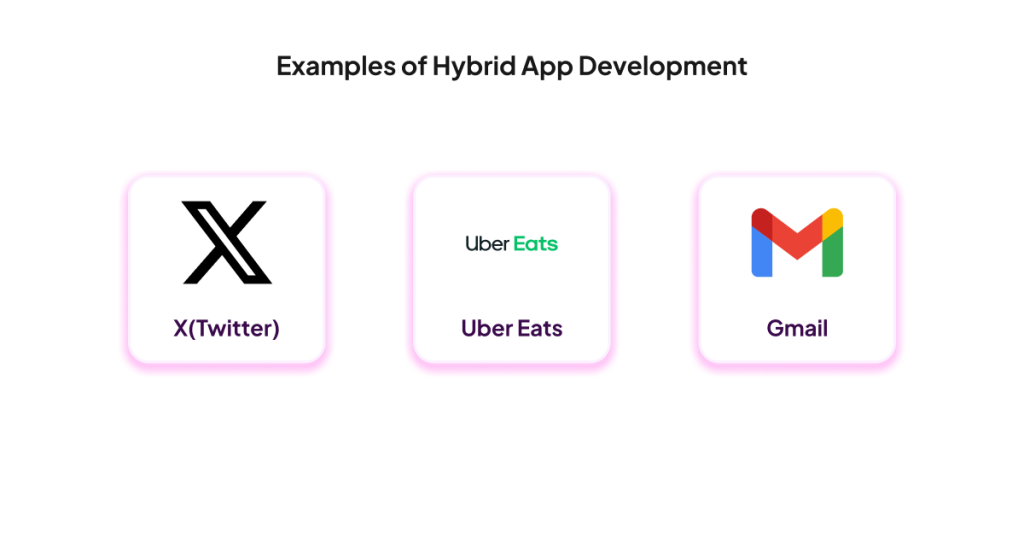
- Twitter: This social media application has been designed with a hybrid architecture that makes it able to function across iOS and Android without any bugs using the same codebase, one of the core features from native vs hybrid app comparison.
- Uber Eats: In the native vs hybrid app debate, Uber Eats a food delivery service highlights how hybrid development saves time and money when it comes to providing a consistent experience across platforms.
- Gmail: For the ongoing discussion of native vs. hybrid apps, Google uses hybrid to build their email service and all three capabilities, seamless experience, and flexibility.
Cost and Maintenance : Native Vs. Hybrid App
| Native App | Hybrid App | |
|---|---|---|
| Development Cost | More expensive due to building each platform separately. | Decreased cost since a single codebase serves multiple platforms. |
| Maintenance Cost | Increased maintenance overhead since updates must be made on each platform. | Reduced cost of maintenance, updates made on all platforms at the same time. |
| Long-Term Investment | Long-term investment, but better performance and user experience will bring better profits. | Requires a lower initial investment, and is great for companies with small budgets. |

Conclusion
In this blog, we’ve compared native vs hybrid app to help you out for picking the best option that fits your needs. Depending on your business goals, you may need affordable cross-platform solutions or performance-driven ones.
As one of the top Mobile App Development Companies in Chennai, Pyramidion can guide you to the best solution for your business.
Focusing your project needs in mind, we build native and hybrid apps with lightweight code for easy processes to focus only on performing well. Whether you are planning to build an app or need professional help, contact us and let us help turn your ideas into a real product!
FAQs
- Native Apps vs Hybrid Apps: Which is the Better?
It depends on your goals. Native apps perform better, while hybrid apps work best when we want to reach several platforms for a smaller amount of money. - How to Check On App Tech Stack?
By checking the code of apps or their performance metrics. - Can hybrid apps work offline?
Yes, hybrid apps can work offline but their functionality is not as powerful as a native app. - Native vs. Hybrid App: Which option is more expensive?
Native apps cost more because they require development for each platform, whereas hybrid apps are a more affordable option.

As the Director of Business Development, I have provided top-notch IT solutions for over a decade for software development, mobile application development, and blockchain development. My main work and passion lie in contributing to the business’s success through knowledge, creativity, hard work, and strong organizational skills.







